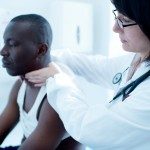Lien vers Pubmed [PMID] – 34124709
Lien DOI – 10.1016/j.lanepe.2021.100148
Lancet Reg Health Eur 2021 Aug; 7(): 100148
We aimed to assess the role of different setting and activities in acquiring SARS-CoV-2 infection.In this nationwide case-control study, cases were SARS-CoV-2 infected adults recruited between 27 October and 30 November 2020. Controls were individuals from the Ipsos market research database matched to cases by age, sex, region, population density and time period. Participants completed an online questionnaire on recent activity-related exposures.Among 3426 cases and 1713 controls, in multivariable analysis, we found an increased risk of infection associated with any additional person living in the household (adjusted-OR: 1•16; 95%CI: 1•11-1•21); having children attending day-care (aOR: 1•31; 95%CI: 1•02-1•62), kindergarten (aOR: 1•27; 95%CI: 1•09-1•45), middle school (aOR: 1•30; 95%CI: 1•15-1•47), or high school (aOR: 1•18; 95%CI: 1•05-1•34); with attending professional (aOR: 1•15; 95%CI: 1•04-1•26) or private gatherings (aOR: 1•57; 95%CI: 1•45-1•71); and with having frequented bars and restaurants (aOR: 1•95; 95%CI: 1•76-2•15), or having practiced indoor sports activities (aOR: 1•36; 95%CI: 1•15-1•62). We found no increase in risk associated with frequenting shops, cultural or religious gatherings, or with transportation, except for carpooling (aOR: 1•47; 95%CI: 1•28-1•69). Teleworking was associated with decreased risk of infection (aOR: 0•65; 95%CI: 0•56-0•75).Places and activities during which infection prevention and control measures may be difficult to fully enforce were those with increased risk of infection. Children attending day-care, kindergarten, middle and high schools, but not primary schools, were potential sources of infection for the household.Institut Pasteur, Research & Action Emerging Infectious Diseases (REACTing), Fondation de France (Alliance” Tous unis contre le virus”).










